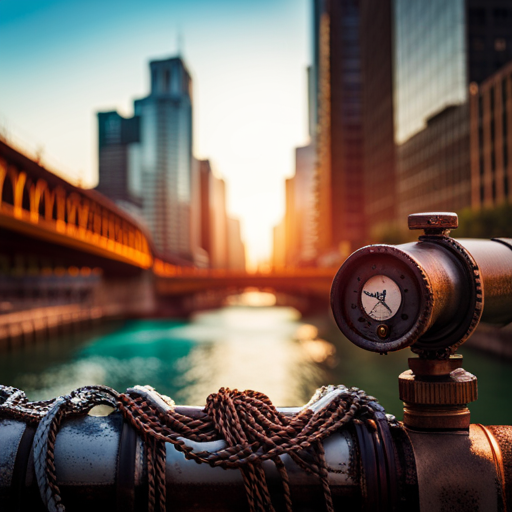Have you ever noticed a metallic taste in your tap water while living in Chicago? That’s because the city’s water is considered hard.
With an average water hardness ranging from 130 to 150 mg/L of calcium carbonate or 7.6 to 8.8 grains per gallon, Chicago’s water is known for its high mineral content. This is primarily due to the fact that the water comes from Lake Michigan, which picks up hardness mostly from calcium.
While hard water is not harmful to your health, it can have negative effects on your plumbing, fixtures, and appliances. Over time, the minerals in hard water can build up and cause damage to your pipes, leading to costly repairs. Your appliances, such as dishwashers and washing machines, may also wear out faster due to the buildup of minerals.
In this article, we’ll explore the facts and effects of Chicago’s hard water, as well as provide solutions to address it.
Key Takeaways
– Chicago’s average water hardness ranges from 130 to 150 mg/L of calcium carbonate or 7.6 to 8.8 grains per gallon, with tap water coming from Lake Michigan which picks up primarily calcium.
– Hard water can cause damage to pipes, deposits on fixtures, and interfere with soap performance, and can increase plumbing costs due to buildup in pipes and fixtures.
– Hard water can be reduced by installing a water softener in your home, which uses ion exchange resin to remove calcium and magnesium ions from the water supply, replacing them with sodium ions.
– Chicago’s tap water is safe for drinking according to testing by the Chicago Department of Water Management and the Environmental Protection Agency, and the Bureau tests for water quality around the clock, every day of the year.
Water Hardness Levels
You may be interested to know that the average water hardness in Chicago ranges from 130 to 150 mg/L of calcium carbonate or 7.6 to 8.8 grains per gallon. This is due to the fact that tap water in Chicago comes from Lake Michigan, which picks up hardness primarily from calcium sources.
Although the water provided by the Department of Water Management exceeds current and proposed water quality standards, hard water can still cause damage to pipes, deposits on fixtures, and interfere with soap performance. Hard water can also increase plumbing costs due to buildup in pipes and fixtures, and reduce the efficiency of water heaters as calcium builds up on the heating element.
Moreover, the environmental impacts of hard water should also be taken into consideration. Hard water can cause soap scum buildup on shower walls and dishes that are difficult to remove, leading to more chemicals being used in the cleaning process. Old water pipes that are still in service for many homes may also leach dangerous levels of lead into the water.
To avoid these issues, it’s recommended to install a water softener in your home to reduce the hardness of your drinking water.
Effects and Consequences
Experiencing issues with soap scum buildup and plumbing costs may be caused by the water hardness levels in your area. Here are some effects of hard water that you may not be aware of:
– Hard water can lead to health impacts as it contains high levels of calcium and magnesium. Over time, this can lead to the formation of kidney stones and other health problems.
– Hard water can also cause damage to your hair and skin, making them feel dry and itchy. It can make it difficult to maintain a healthy pH balance on your skin, which can lead to breakouts and other skin issues.
– Hard water can lead to increased energy costs as it reduces the efficiency of water heaters and other appliances. Calcium and magnesium buildup can reduce the flow of water and make it harder for these appliances to heat the water.
If you’re looking for alternatives to water softeners, there are a few options available. One option is to use a showerhead filter that removes minerals from the water. Another alternative is to use a reverse osmosis system, which removes minerals from the water at the source. You can also try using vinegar or lemon juice to remove soap scum buildup on fixtures and surfaces.
Water Softener Solutions
Consider installing a water softener in your home to reduce the amount of calcium and magnesium in your tap water and prevent damage to your plumbing and appliances. Water softeners use ion exchange resin to remove the minerals that cause hard water and replace them with sodium ions.
By doing so, you can enjoy several benefits, such as cleaner and softer clothes, less soap scum in your shower, and a longer lifespan of your water heater and other appliances.
When it comes to maintenance, Crystal Quest whole house water softeners are designed for maximum filtration and performance with minimum upkeep. They’re simple to use, dependable, and easy to program, providing trouble-free operation for years to come.
With a water softener, you can also save money on plumbing repairs and reduce the amount of soap and detergent needed for cleaning. So, if you want to improve the quality of your tap water and protect your home from the effects of hard water, installing a water softener is a smart and cost-effective solution.
Conclusion
So, what can you do about Chicago’s hard water? Fortunately, there are solutions available.
One option is to install a water softener, which will remove the excess minerals that cause hardness and improve the quality of your water. This can also help prevent damage to your plumbing, fixtures, and appliances, saving you money in the long run.
Another option is to use a water filtration system, which can help remove impurities and improve the taste of your water. It’s important to do your research and choose a system that’s appropriate for your needs and budget.
With the right solution, you can enjoy cleaner, better-tasting water in your Chicago home.
